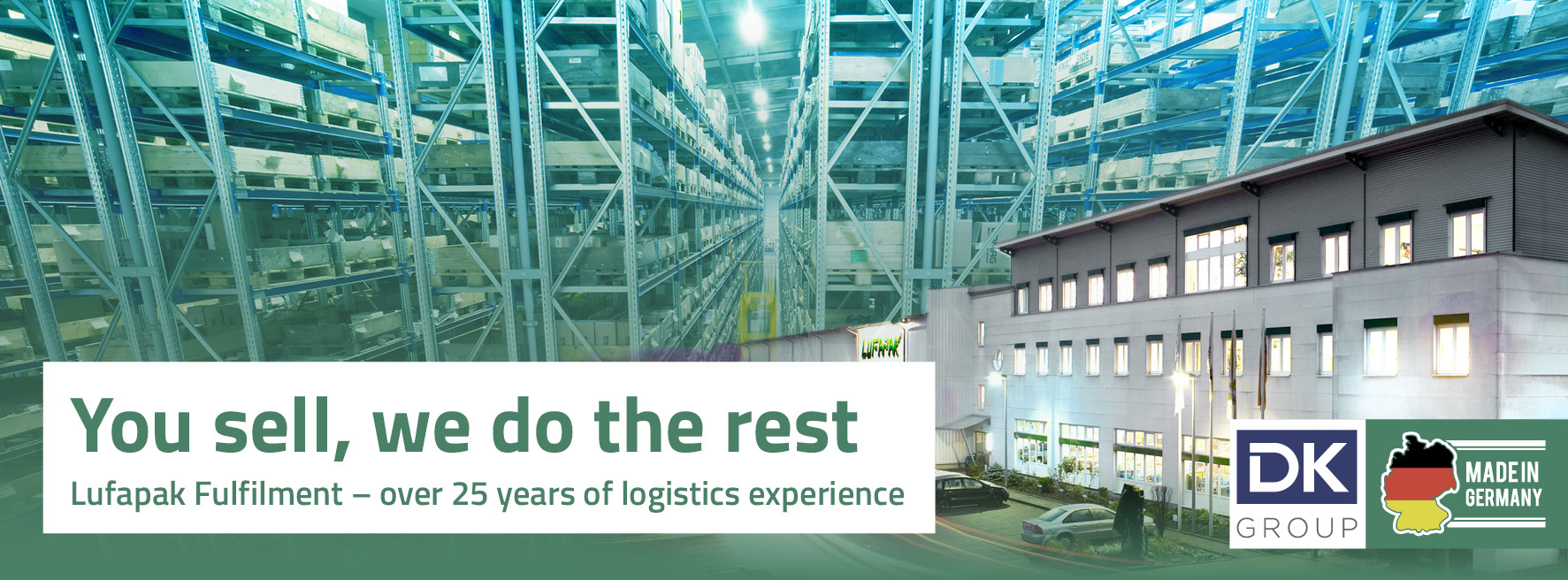sales@lufapak.de +49 2631/384-0 Contactform
Shipping logistics
What is shipping logistics?
Shipping logistics refers to the process of organizing, planning, and executing all activities related to the transport of goods from the warehouse to the end customer. As a central element of the supply chain, it encompasses all steps from order processing to final delivery. Through coordinated processes, shipping logistics ensures a smooth flow of goods between companies and customers.
The complexity of the processes, which must be precisely coordinated, is remarkable. From the moment the order is placed to delivery, each shipment passes through several logistical stages. The networking of these individual components forms the foundation for reliable deliveries and satisfied customers.
The shipping logistics sector has become a decisive competitive factor, particularly due to the growing e-commerce market. Companies that optimize their shipping logistics can not only reduce costs, but also increase customer satisfaction and gain competitive advantages. This explains why companies are increasingly investing in efficient logistics structures.
The core processes of shipping logistics
Shipping logistics is divided into several core processes that build on each other. The first step is order acceptance, where customer orders are recorded and entered into the system. This is followed by picking, which involves gathering the ordered goods from the warehouse. This process is increasingly supported by automated systems that minimize error rates and increase speed.
After picking, the products are packaged, taking into account both safety aspects and efficiency criteria. Shipping preparation then includes creating the shipping documents, addressing, and selecting the optimal shipping route. Finally, transport takes over the physical delivery of the goods to the customer, which can be carried out using various means of transport.

These processes are accompanied by a comprehensive tracking system that records the current status of the shipment and makes it transparent. The traceability of goods not only increases planning reliability for companies, but also allows customers to locate their delivery at any time. Efficient shipping logistics is characterized by seamless transitions between these core processes.
Modern technologies in shipping logistics
Advanced software solutions are fundamentally revolutionizing the shipping logistics sector. Warehouse management systems (WMS) optimize warehousing through intelligent placement algorithms and significantly speed up the picking process. Transport management systems (TMS) support route planning and vehicle utilization, enabling transport capacities to be better utilized.
Multi-carrier shipping software enables the automated comparison of different shipping service providers and selects the optimal provider based on defined parameters such as cost, delivery time, or reliability. These systems are complemented by mobile scanning technologies and cloud-based platforms that ensure location-independent access to shipping information.
Artificial intelligence and machine learning are also finding their way into shipping logistics. Predictive analytics enable accurate forecasts of order volumes and optimal shipping times. Robotics and automation accelerate physical processes in the warehouse while reducing the error rate. These technological developments significantly increase the efficiency of the entire shipping chain.
The role of shipping logistics in e-commerce
Shipping logistics plays a key role in e-commerce. Online retail has fundamentally changed consumer expectations—fast delivery times, flexible delivery options, and transparent shipment tracking are now considered standard. Shipping logistics experts are faced with the challenge of meeting these requirements cost-effectively while dealing with growing order volumes.
Same-day and next-day delivery have established themselves as important differentiators in the competitive landscape. Implementing such services requires highly optimized logistics processes and strategically located distribution centers. At the same time, companies must offer flexible delivery options such as parcel shops, packing stations, or preferred delivery times to meet individual customer needs.
The growing trend toward omnichannel retailing further increases complexity. Shipping logistics must function seamlessly across different sales channels and provide consistent delivery experiences, regardless of whether customers order online, via mobile devices, or in brick-and-mortar stores. Successful e-commerce companies therefore view their shipping logistics not as a pure cost factor, but as a strategic competitive advantage.
Optimization of shipping costs
Strategic cost optimization is a key aspect of successful shipping logistics. Efficient route planning can shorten transport routes and significantly reduce fuel costs. Shipment consolidation, which combines multiple deliveries for recipients in close geographical proximity, is particularly effective. This bundling maximizes vehicle utilization and reduces costs per shipment.
Choosing the right shipping service provider also plays a crucial role. Different providers offer different pricing models that vary depending on shipment volume, weight, dimensions, and destination. Modern shipping logistics systems enable these offers to be compared automatically and select the most cost-effective provider for each individual shipment.
Volumetric optimization of packaging also contributes to cost reduction. Tailor-made packaging solutions eliminate unnecessary empty space, which means less filling material is required and more shipments can be accommodated per transport unit. Progressive companies use special software that calculates the ideal packaging type for each order, thereby systematically optimizing shipping costs.
Sustainability in shipping logistics
Environmental awareness is increasingly shaping the shipping logistics sector. Companies are increasingly focusing on reducing CO2 emissions through more efficient route planning and alternative drive concepts. Electric and hydrogen vehicles are increasingly being used, especially for inner-city deliveries. These measures not only reduce the ecological footprint, but also meet growing customer expectations for sustainable supply chains.
Sustainable packaging materials are another focus. Recyclable cardboard boxes, plastic-free padding, and biodegradable shipping bags are replacing conventional packaging. Innovative concepts such as reusable transport boxes for regular deliveries are also gaining in importance. Shipping logistics experts are also optimizing packaging sizes to minimize material consumption and transport volumes.
Alternative transport methods complement the sustainability concept. Cargo bikes for urban deliveries, combined road and rail transport, and consolidated delivery concepts significantly reduce emissions. Systematic carbon tracking enables the measurement and continuous improvement of the environmental balance. Sustainable shipping logistics is thus evolving from an optional extra to a strategic success factor – economically sensible and ecologically valuable.
Challenges in shipping logistics
Delivery bottlenecks are a fundamental challenge in shipping logistics. Unpredictable events such as natural disasters, political crises, or pandemics can severely disrupt supply chains. Robust shipping logistics concepts therefore require alternative procurement channels and flexible transport capacities to bridge bottlenecks and meet delivery promises.
International customs regulations add to the complexity. Divergent import regulations, trade agreements, and customs duties require specialized knowledge and careful documentation. For globally active companies, this means a considerable administrative burden that can only be efficiently managed through digitized processes and specialized expertise.
Volatile transport costs due to fluctuating fuel prices and freight capacities have a significant impact on calculation reliability. Shipping logistics managers must take these dynamics into account when planning and develop flexible pricing models. In addition, the growing shortage of skilled workers in warehousing and transport is causing staffing problems for many companies. Automation and improved working conditions can partially mitigate this challenge.
Shipping logistics in an international context
Cross-border shipping logistics requires specific expertise and precise planning. Different legal regulations, import requirements, and cultural characteristics shape the international shipping business. Knowledge of local conditions, reliable partner networks, and transparent communication with all parties involved form the basis of successful global supply chains.
Intercontinental transport solutions include various modes of transport such as air, sea, rail, and road. The optimal combination of these transport modes—known as intermodal transport—minimizes costs and transit times. Air freight solutions offer decisive advantages, especially for time-critical shipments, while sea freight is more cost-effective for larger volumes. Shipping logistics specialists select the ideal mode of transport based on shipment characteristics and customer requirements.
Documentation and compliance play a key role in international shipping. Customs documents, certificates of origin, and export licenses must be correct and complete to avoid costly delays. Modern shipping logistics systems largely automate these documentary processes, thereby reducing sources of error. At the same time, they enable seamless traceability of goods across national borders.
Digitalization and automation
Process automation is fundamentally changing shipping logistics. Robot-assisted picking, autonomous transport systems, and automated packaging systems significantly increase efficiency. These systems work precisely, quickly, and enable 24-hour operation. The initial investment in automation technology pays for itself through increased throughput and reduced personnel costs.
AI-supported forecasts are revolutionizing shipping planning. By analyzing historical data and external factors such as seasonality, weather conditions, or marketing activities, intelligent algorithms make accurate predictions about expected shipment volumes. These forecasts enable proactive capacity planning and optimal resource allocation in shipping logistics.
Digital twins virtually replicate physical logistics systems and simulate various scenarios in real time. This allows shipping logistics managers to test process changes without disrupting ongoing operations. This technology identifies bottlenecks, optimizes processes, and improves the resilience of the entire shipping chain. Complemented by advanced IoT sensor technology, the result is a connected system that continuously collects data and uses it to improve processes.
Future trends in shipping logistics
Autonomous transport systems will shape the shipping logistics of the future. Self-driving delivery vehicles, automated warehouse shuttles, and driverless forklifts reduce human intervention to a minimum. These technologies not only increase efficiency but also improve workplace safety. Autonomous systems show their full potential especially in standardized environments such as distribution centers or fixed transport routes.
Drone deliveries are evolving from the experimental stage to a marketable solution. They offer decisive advantages for certain application scenarios, such as the rapid delivery of urgent shipments to areas that are difficult to access. Regulatory hurdles are gradually being removed, making the commercial use of delivery drones in shipping logistics increasingly realistic.
Innovative last-mile concepts address the final and often most cost-intensive stage of shipping logistics. Micro-depots in city centers, crowdshipping models, and smart parcel boxes optimize final delivery. Hybrid approaches that flexibly combine different delivery methods are particularly promising. Increasing urbanization and the growing e-commerce market will further accelerate these developments in shipping logistics and give rise to new creative solutions.
Contact us now and get advice

